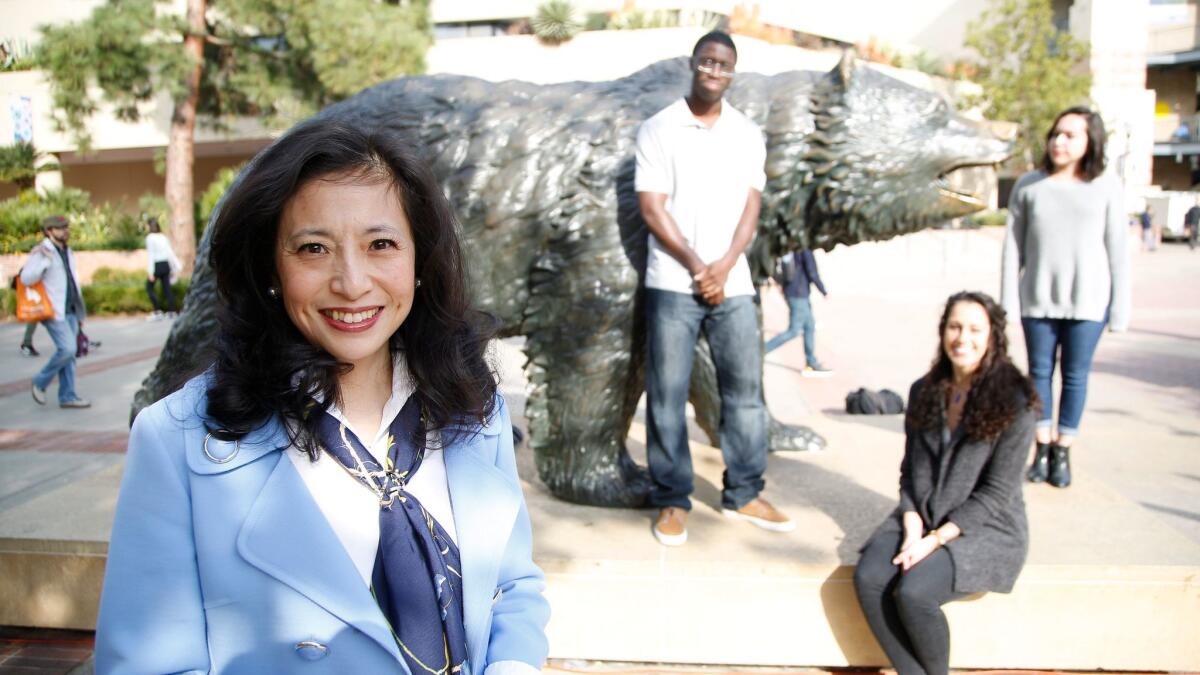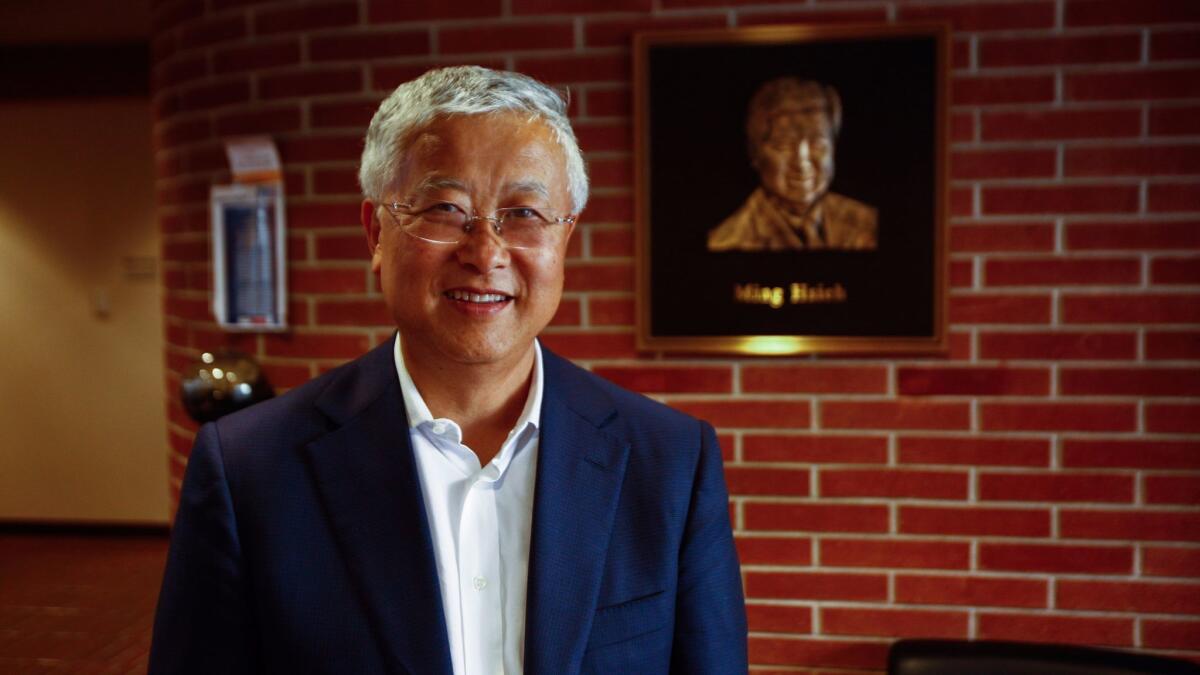Donors of Chinese descent vastly increase philanthropy, mostly to higher education

- Share via
Major philanthropic gifts by Chinese Americans have surged nearly fivefold to almost $500 million in recent years, with most of the money going to higher education, a new study has found.
Philanthropy by donors in China also soared as the nation’s roaring economy produced more billionaires than in the United States and helped fuel a 430% increase in a decade in the number of registered charitable foundations in China — 5,545 in 2016, the study reported. In 2014, Chinese philanthropic giving reached $16.7 billion.
“Chinese and Chinese American Philanthropy” is the first academic effort to examine the size, motivation and impact of giving by Chinese and Chinese Americans in the United States and China. The research, by the UCLA Luskin School of Public Affairs, the Long U.S.-China Institute at
“Major contributions by Chinese and Chinese American philanthropists are having a dramatic and positive effect — widening access to higher education, advancing innovations in health research and science and supporting the arts and culture,” Stewart Kwoh, president of Asian Americans Advancing Justice-L.A., said in a statement.
John Long, a global real estate investor whose family foundation established the Long U.S.-China Institute in 2010, said he was troubled by what he called public perceptions that Chinese and Chinese Americans were not sufficiently giving back to the United States. He said he encounters criticism, for instance, that Chinese Americans don’t participate enough in
A 2001 survey commissioned by the Committee of 100, a national organization of Chinese American leaders, found that 1 in 5 Americans polled said Chinese Americans “don’t care what happens to anyone but their own kind.”
“I wanted to see if it’s true that as a group, Chinese are people who don’t give back,” Long said in an interview. “This study dispels the idea. We are as philanthropic if not more philanthropic than other groups.”
The study examined donors of Chinese descent in the United States, China, Hong Kong, Taiwan and Macau who gave an average of at least $1 million in three individual years between 2008 and 2014. Researchers profiled 35 Chinese and 29 Chinese Americans to look at their motivations for giving and the effect they had.

Long, a UCLA graduate who immigrated to the United States from southern China at age 6, and his wife, Marilyn, who was born in Salinas, Calif., said they were inspired to share their wealth by their Christian faith and the example of other philanthropists such as
“The UC definitely shaped my life and gave me opportunities that I wouldn’t have had otherwise,” John Long said.
Shirley and Walter Wang, who both lived in Taiwan when they were young, made their mint manufacturing plastic pipes and fiberglass doors. They said their giving was inspired by their Christian faith and the example of their family elders.
Shirley Wang, a UCLA graduate, is the first Asian American to head the UCLA Foundation and donated $1 million to the campus for middle-class scholarships last year. The Wangs estimated they gave between $20 million and $30 million over the last 15 years, mostly to enhance education, public health and the environment in the United States, Africa and Asia.
The couple donated 400 miles of plastic pipes, for instance, to bring water to 350,000 people in eight African countries. In addition to funding scholarships, they have given money to UCLA for educational films about Chinese Americans, travel abroad and computer science programs.
“In the last 20 years, more Asians have become more well-to-do and they finally have the ability to give,” Walter Wang said.

Ming Hsieh, who pioneered technology in fingerprint identification, survived China's tumultuous Cultural Revolution and landed at USC in 1980, earning a bachelor’s and a master’s degree in electrical engineering. He said he didn’t know about philanthropy when he got to campus — but learned that USC buildings were named after people who had donated to the campus.
Hsieh gave $35 million in 2006 to the USC electrical engineering department and $50 million in 2010 to establish and endow an institute in nanomedicine to develop new cancer therapies. His total giving since 2006 tops $100 million, with gifts to other universities, schools, museums and hospitals. But his first priority has been USC, where he serves as a trustee.
I wanted to give back to the place where I got my knowledge and help the next generation live longer, healthier lives in a better environment.
— Ming Hsieh, USC donor
“I wanted to give back to the place where I got my knowledge and help the next generation live longer, healthier lives in a better environment," he said in an interview. “Education changes the world.”
Among the study’s highlights:
- The number of Chinese American foundations in the United States grew 418%, to nearly 1,300, from 2000 to 2014. More than 80% of the foundations have been established since 2000.
- About 66% of the gifts between 2008 and 2014 went to higher education. In the United States, private universities such as Harvard, USC and Stanford received most of the major donations. But in 2017, Chinese Americans gave more than $50 million in major gifts to UC Berkeley, UC San Francisco, UCLA and UC Irvine, Kwoh said.
- Gifts from Chinese Americans accounted for 1.2% of all major U.S. philanthropic gifts between 2008 and 2014. That percentage was roughly proportional to their population of about 4 million.
Kwoh said he hoped the study and a new website on Chinese philanthropy would encourage more giving.
“It’s important not only to recognize this philanthropy but also to tap this energy and interest to benefit this country and its many communities,” Kwoh said.
ALSO
La Tuna fire, city's biggest by acreage, now 80% contained, officials say
California educational leaders vow to protect immigrant students from deportation
Sign up for Essential California
The most important California stories and recommendations in your inbox every morning.
You may occasionally receive promotional content from the Los Angeles Times.








